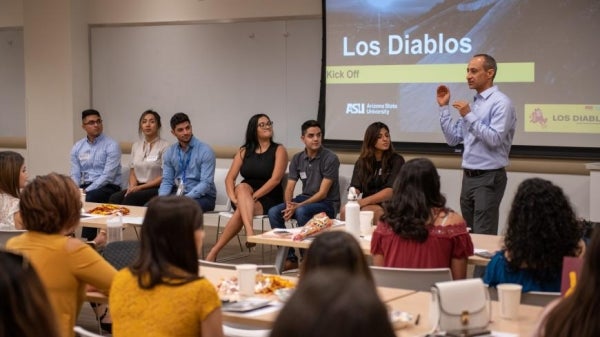ASU anthropology professor earns Outstanding Doctoral Mentor Award

Cindi SturtzSreetharan. Courtesy photo
Cindi SturtzSreetharan, a professor in the School of Human Evolution and Social Change, recently received the Outstanding Doctoral Mentor Award as part of the Graduate College’s 2023–24 Outstanding Faculty Mentors.
The recipient of the Outstanding Doctoral Mentor Award is chosen by the Graduate College at Arizona State University, based on the faculty member’s portfolio and letters of support from their students, postdoctoral fellows and faculty chair.
SturtzSreetharan, a linguistic anthropologist, examines how language shapes human understanding and everyday life. Her recent research centers on the intersection of language, the body and medicine, and the common conversation engagement strategy called “fat talk.”
“It feels validating, but it’s important to know that mentoring is never a solo endeavor,” SturtzSreetharan said about the award. “It takes a village, and ASU provides the space to create that and thrive in it. So while it is validating, I also feel this award should go to many people.”
Her mentorship is deeply rooted in her expertise as a linguistic anthropologist. She recognizes the nuances of languages and the importance of fostering a safe and inclusive environment for mentorship.
Through thoughtful questioning, active listening and collaborative engagement, she establishes mutual expectations and fosters meaningful academic growth.
“Questioning alone is a really difficult interaction. However, the only way to ascertain what someone wants is usually by asking questions,” she said. “I give students options and explain why I’m asking the question.
“For example, instead of asking why someone is getting a PhD, which can seem threatening, I say something like, ‘I understand you want a PhD. What are your long-term goals? I am asking this question to confirm what we must do to achieve those goals.’”
SturtzSreetharan also acknowledges that mentorship is a collaborative process and that she continues learning from her students.
“Students may not realize it, but I’m often a mentee, too, especially when the students are pursuing topics of inquiry that are not within my direct expertise,” she said. “I don’t assume my skills are complete but must nurture them, changing them to meet mentees where they are.”
More University news

ASU Alumni Association to honor 3 outstanding alumni leaders during Homecoming
The Arizona State University Alumni Association will proudly recognize three innovative alumni leaders during the Homecoming Parade and football game against Brigham Young University on Saturday, Nov…

From service to civilian success
Transitioning from military to civilian life is a unique experience that can be challenging for veterans. Some struggle to find their purpose, while others seek a network of people and resources to…

ASU as the 'New American University' sets the model for higher education reform
Arizona State University’s charter is only 46 words long, but it’s a bold promise that’s a model for the reinvention of higher education.The document, formally introduced by ASU President Michael…